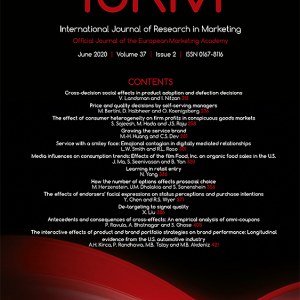
Lemmens, A., Roos, J., Gabel, S., Ascarza, E., Bruno, H., Gordon, B., Israeli, A., \McDonnell Feit\, E., Mela, C. and Netzer, O. (2025). Personalization and Targeting: How to Experiment, Learn and Optimize International Journal of Research in Marketing, :.
-
Affiliated authorJason Roos
-
Publication year2025
-
JournalInternational Journal of Research in Marketing
Personalization has become the heartbeat of modern marketing. The rapid expansion of individual-level data, the proliferation of personalized communication channels, and advancements in experimentation have fundamentally reshaped how firms tailor their marketing strategies. Furthermore, causal inference and machine learning enable companies to understand how the same marketing action can impact the choices of individual customers differently. This article provides an academic overview of these developments. We formalize personalization as a causal inference problem embedded in the test and learn framework. We review key challenges and solutions that arise when personalization is approached through causal inference, including data limitations, treatment effect heterogeneity, policy evaluation, and ethical considerations. Finally, we identify emerging research trends stemming from new methodologies such as generic and double machine learning, direct policy learning, foundation models, and generative AI.